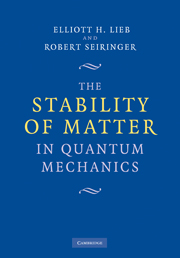Book contents
- Frontmatter
- Contents
- Preface
- 1 Prologue
- 2 Introduction to Elementary Quantum Mechanics and Stability of the First Kind
- 3 Many-Particle Systems and Stability of the Second Kind
- 4 Lieb–Thirring and Related Inequalities
- 5 Electrostatic Inequalities
- 6 An Estimation of the Indirect Part of the Coulomb Energy
- 7 Stability of Non-Relativistic Matter
- 8 Stability of Relativistic Matter
- 9 Magnetic Fields and the Pauli Operator
- 10 The Dirac Operator and the Brown–Ravenhall Model
- 11 Quantized Electromagnetic Fields and Stability of Matter
- 12 The Ionization Problem, and the Dependence of the Energy on N and M Separately
- 13 Gravitational Stability of White Dwarfs and Neutron Stars
- 14 The Thermodynamic Limit for Coulomb Systems
- List of Symbols
- Bibliography
- Index
12 - The Ionization Problem, and the Dependence of the Energy on N and M Separately
Published online by Cambridge University Press: 20 December 2010
- Frontmatter
- Contents
- Preface
- 1 Prologue
- 2 Introduction to Elementary Quantum Mechanics and Stability of the First Kind
- 3 Many-Particle Systems and Stability of the Second Kind
- 4 Lieb–Thirring and Related Inequalities
- 5 Electrostatic Inequalities
- 6 An Estimation of the Indirect Part of the Coulomb Energy
- 7 Stability of Non-Relativistic Matter
- 8 Stability of Relativistic Matter
- 9 Magnetic Fields and the Pauli Operator
- 10 The Dirac Operator and the Brown–Ravenhall Model
- 11 Quantized Electromagnetic Fields and Stability of Matter
- 12 The Ionization Problem, and the Dependence of the Energy on N and M Separately
- 13 Gravitational Stability of White Dwarfs and Neutron Stars
- 14 The Thermodynamic Limit for Coulomb Systems
- List of Symbols
- Bibliography
- Index
Summary
Introduction
The results in the preceding chapters on stability of the second kind were mostly of the form E0 > −C(N + M), where E0 denotes the ground state energy of the system, and N and M are the number of electrons and nuclei, respectively. It is obvious, however, that if N is very large or very small compared to M the excess number of particles, positive or negative as the case may be, will float away to infinity. In other words it ought to be possible to reformulate the previous results as E0 > −C′ min{N, M} for a suitable C′ that depends only on the nuclear-electron charge ratio Z.
In the relativistic case discussed in Chapter 8, the energy is actually nonnegative for suitable α and Z, independently of N and M. From this we conclude that also the non-relativistic energy can be bounded below by E0 > −CN independent of M, as discussed in Remark 8.6. (For an alternative method, see.) Also the results in Chapters 9 and 10 yielded bounds of this form, since they rely in an essential way on the non-negativity of the relativistic energy in Chapter 8. This answers half the problem, namely it gives a bound on the energy of the correct form if M is larger than N.
- Type
- Chapter
- Information
- The Stability of Matter in Quantum Mechanics , pp. 221 - 232Publisher: Cambridge University PressPrint publication year: 2009



